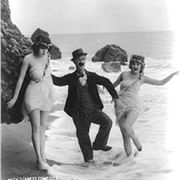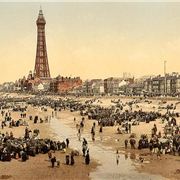IF you do like to be beside the seaside - particularly up at Ainsdale or Blackpool on scorching days - leave the bathing costume at home.
Sea bathing along a massive stretch of the Liverpool bay shore, right up to Cumbria faces being outlawed by unelected European bureaucrats.
New EU rules are set to ban a dip in the sea at more than 50 of England’s best known beaches, which risk being designated as unsafe for swimming.
Draconian
The Environment Agency has warned that the beaches, listed among 500 bathing sites around the country, are unlikely to meet new water cleanliness standards that come into force in 2015.
But Liverpool-based UKIP Euro MP Paul Nuttall said it was more evidence of European health and safety gone mad, and would harm tourist industries of traditional seaside resorts.
“People will be unable to go for a swim after 2015 because Draconian new standards for bathing water will come into force, he said.

“We already have strict standards in this country but no, bureaucrats in Brussels have to interfere and in doing so put at risk an integral part of our tourist industry.”
He added: “Everyone loves going to the beach on a sunny day and having a dip to cool off is all part of the fun. Health and safety rules have already taken fun out of many leisure activities and here we go again with interference in a traditional activity.”
The revised European Bathing Water Directive will require water to be twice as clean to achieve the highest standard – a rating of Excellent and beaches that fail annual tests will fall foul.
Mr Nuttall, who is also deputy leader of UKIP, added: “Twenty of those beaches are in my constituency and I am very concerned that unless water quality is improved in time, tourism, which plays a big role in the local economy, will be badly hit.
“Our household water bills have soared in recent years to finance billions of pounds to treat and clean-up sewage released into rivers and the sea. Unfortunately last year’s wettest summer for 100 years led to an increase in bacteria and viruses ending up in bathing waters.
“Such pollution can originate from farmland and urban run-off, storm waters, misconnected plumbing, septic tanks and dog faeces. As for the latter, well no one wants to encounter such mess on the beach and if dog owners cannot be responsible for their pets then more beaches will ban dogs altogether.
“We do not need the EU telling us how to live our lives, though as we know they do so more and more, they make rules for the sake of it.
“We are quite capable of devising our own standards. The revised European Bathing Water Directive will require water to be twice as clean as applies currently to achieve the highest standard.”
Some tourism bosses have called for a more flexible approach to allow daily updates so that beaches would only have to close on days when pollution reached hazardous levels.
But, said Mr Nuttall: “That is certainly a compromise but sadly we all know too well that the EU is not interested in compromise or re-negotiation.”
Tide of change - the North West's affected beaches
Ainsdale, Sefton, Merseyside
St Annes, Lytham Saint Annes, Lancashire
St Annes North, Lytham Saint Annes, Lancashire
Blackpool South, Lancashire
Blackpool Central, Lancashire
Blackpool North, Lancashire
Cleveleys, Lancashire
Fleetwood, Lancashire
Heysham Half Moon Bay, Lancashire
Morecambe South, Lancashire
Morecambe North, Lancashire
Biggar Bank, Walney Island, Barrow in Furness, Cumbria
Sandy Gap, Walney Island, Barrow in Furness, Cumbria
West Shore, Walney Island, Barrow in Furness, Cumbria
Roanhead, Cumbria
Askam-in-Furness, Cumbria
Haverigg, Cumbria
Seascale, Cumbria
Allonby, Cumbria
Silloth, Cumbria










